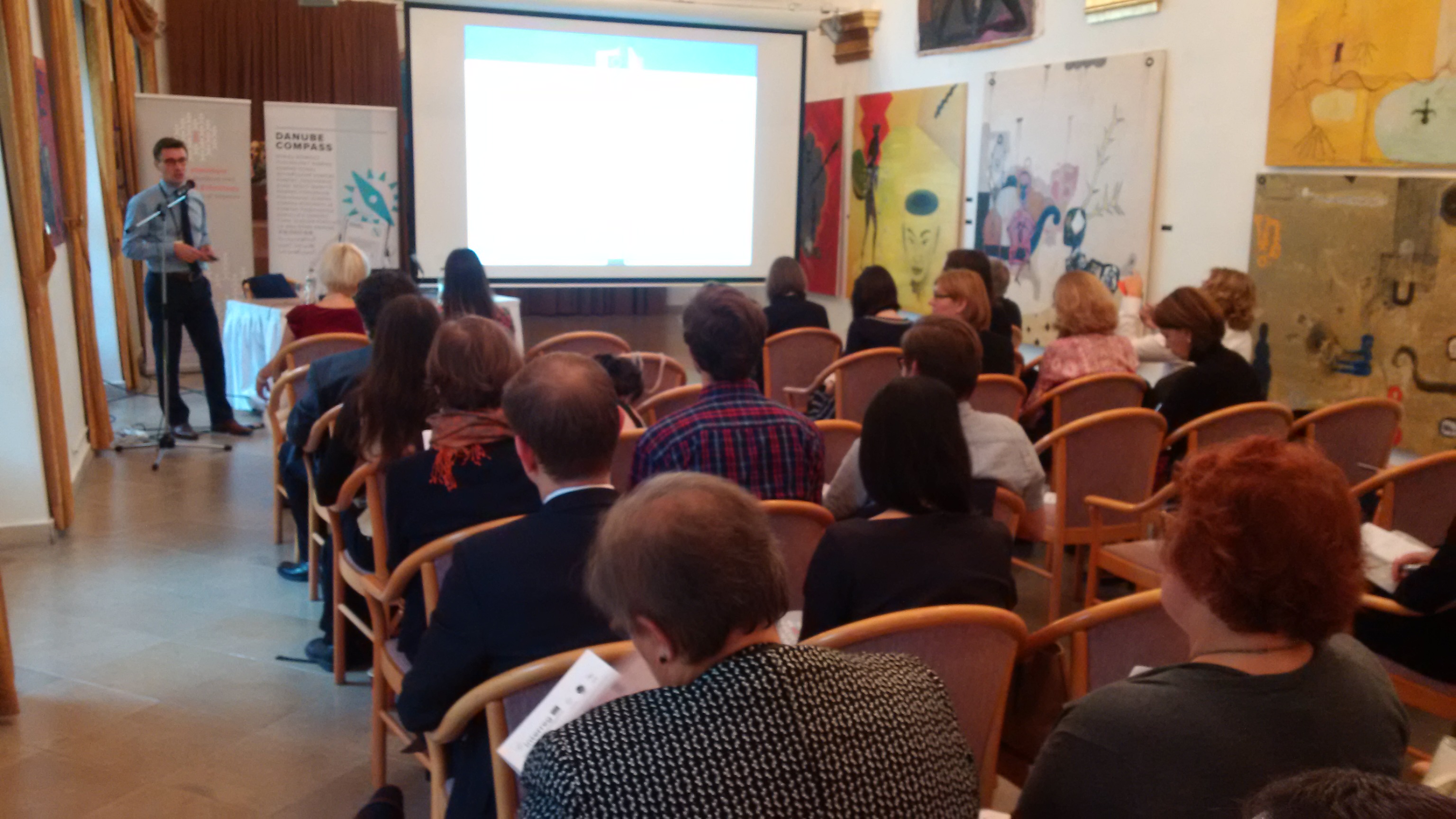DRIM Danube Region Information Platform for Economic Integration of Migrants
Conference "Information Matters"

Information matters: towards positive pathways of migrants’ integration
International Conference, Pálffyho palác, Bratislava, October 26th, 2017
Keynote speakers:
Antoine Savary (European Commission, Migration and Home Affairs)
Em. Prof. Dr. Rinus Penninx (Universiteit van Amsterdam)
Conference agenda:
9:00 - 9:15 Welcome speech and the conference opening
(Representative of the Slovak Academy of Sciences; Tatiana Podolinská, Director of the Institute of Ethnography; Martina Bofulin, Slovenian Migration Institute, Research Centre of the Slovenian Academy of Sciences and Arts and DRIM project Lead Partner)
9:15 - 10:00 1st key-note speaker Mr. Antoine Savary, Deputy head of unit Legal migration and integration, DG Migration and Home Affairs: “EU policy in the field of integration of third-country nationals” (30 minutes + discussion)
10:00 - 10:45 2nd key-note speaker Mr. Rinus Penninx, Professor emeritus at Universiteit van Amsterdam: “Integration processes of immigrants and integration policies in Europe” (30 minutes + discussion)
10:45 - 11:00 Coffee break
11:00 - 12:00 PANEL 1 (chair: Martina Bofulin)
11:00 - 11:15 Petra Schütt, Landeshauptstadt München, Referat für Arbeit und Wirtschaft: „Information dumping or right information. Public institutions as user-oriented information brokers for migrants?“
11:15 - 11:30 Vladimir Sláma, International Organization for Migration, Bratislava:
Migration Information Centre of IOM to support the integration of foreigners in Slovakia
11:30 - 11:45 Ádám Németh, Elisabeth Gruber, Heinz Fassmann, YOUMIG project: Youth Migration in the Danube Region – a Theoretical Approach
11:45 - 12:00 Discussion
12:00 - 12:45 Lunch
13:00 - 13:30 Press Release Conference (parallel with Panel 2) in the foyer saloon of the Pálffy Palace connected with second Coffee break
12:45 - 13:45 PANEL 2 (chair: Alexandra Bitushikova)
12:45 - 13:00 Mária Katerinková, Statistical Office of the Slovak Republic: Foreign migration of population of the Slovak Republic
13:00 - 13:15 Helena Tužinská, Comenius University Bratislava: Understanding culture, understanding law. Ethnography of linguistic flexibility in asylum courts
13:15 - 13:30 Michal Vašečka, Masaryk University Brno: Collective amnesia of Slovaks on their migration and integration experiences in the past
13:30 - 13:45 Discussion
13:45 - 14:30 PANEL 3 (chair: Helena Tužinská)
13:45 - 14:00 Mojca Vah Jevšnik, Slovenian Migration Institute: Work accidents know no borders! Some reflections on the importance of enhancing information on the occupational safety and health of posted workers
14:00 - 14:15 Alen Kovačević, Branislav Makúch, Integration Centre Prague: Pathways and Challenges of Integration at a Local Level in Prague
14:15 - 14:30 Discussion
14:30 - 14:45 Closing speech and conclusion
(Martina Bofulin, Alexandra Bitushikova, Helena Tužinská)
Conference call
With immigration and integration high on the current political agenda, easy and fair access of migrants to practical, comprehensive and topical information as well as the appropriate functioning of respective institutions, are often considered a cornerstone of effective integration measures in the countries of reception. Properly designed policies and modern information channels may considerably facilitate labour market integration, improve educational outcomes and ensure the wellbeing of migrants. This is especially important in the case of newcomers facing unexpected challenges and lacking sufficient information on life and work in a new country.
Although some immigration-oriented countries have responded to this need by introducing innovative approaches and methods within the nexus immigration-integration-information, most countries have not yet taken the opportunity to establish various communication channels destined specifically for migrants to support their advancement in integration. Even a best intended policy and practice may fail if migrants’ access to information is limited and the language used by institutions and other stakeholders too alienated, complex and bureaucratic.
Part of the problems may stem from the fact that over recent years only a handful of rigorous research was conducted on the given topics. Findings point to the problems with accessibility, accuracy and regular updating as well as the scattered nature of information throughout the online and off-line environment. In order to bring light into the interconnectedness of accurate information and well-governed integration processes, this conference will be focused, but not limited, to the following topics:
- What is the role of the State in providing information for migrants within their integration process? How are the NGO community and non-institutional actors (e.g. informal social networks’ groups) responding to this topic? What is the role of supranational entities and organisations (e.g. EU, UN) and how do they collaborate with above mentioned actors?
- How successful have the EU legal norms, strategies, programmes, initiatives and funding been in this field? What are the plans of the Union for the future?
- What are the main modes and mechanisms of delivering information to migrants? How well do the providers know their target groups?
- What are the needs of different groups of migrants with regard to due informing about their integration into society?
- What is the relationship between the level and pace of integration of migrants and the quality and quantity of information that is offered to migrants?
- What is the role of new technologies in ensuring better information sharing? What are progressive and innovative channels ensuring the dissemination of information?
- What are the benefits of effective information provision for the host societies and especially for public service providers?
- What are the best practices of delivering information to migrants? Why are they recognised as best practices and by whom?
- What are the most acute issues in the integration of migrants in the European Union, particularly of economic migrants?
- How are the roles of state institutions, educational facilities, NGO/IGO sectors and other key stakeholders changing in the process?
- What relevance does access to information for migrants have for their involvement in national and Union labour markets contingent on their age, gender, educational level, language skills and other variables?
- What are contemporary trends in labour participation rates of migrants across various economic branches and among various countries? What are the correlations between these and the integration policies in particular countries?
- What is the necessity for and nature of differing integration approaches to various categories of migrants (economic, asylum, family, student etc.) in a changing Europe?
- How developed and beneficial are migration, integration and population policies in individual countries and macro-regions?
We invite scholars, practitioners, NGOs, activists, policymakers and public institutions’ representatives with an interest in this field to share their research findings or critically reflect on their experiences. Following the conference, papers will be evaluated for a peer-reviewed conference volume.
Submission of proposals:
- - Abstract (ca. 200 words)
- - Personal bio (ca. 100 words)
- - Languages: Presentations and abstracts are accepted in English
The documents (abstract and personal bio) are to be sent by e-mail to the following e-mail address: tomas.winkler@savba.sk
- - Deadline for proposals submission: 30th September 2017
- - Notification of acceptance: 6th October 2017
- - Conference date: 26th October 2017, Bratislava
There is no registration fee for the participants. However, the participants should cover their travel and accommodation costs by themselves. Lunch and catering on the day of the conference will be provided by the organizers.
The conference is jointly organized by the Institute of Ethnology, Slovak Academy of Sciences, the Slovenian Migration Institute, Research Centre of the Slovenian Academy of Sciences and Arts and Institute for Labour and Family Research and is part of the activities within the project DRIM (Danube Region Information Platform for Economic Integration of Migrants). The full call for papers can be found here: http://http://uet.sav.sk/files/call_for_papers_-_drim_bratislava_international_conference_0.pdf

Antoine Savary (European Commission, Migration and Home Affairs) during his presentation
